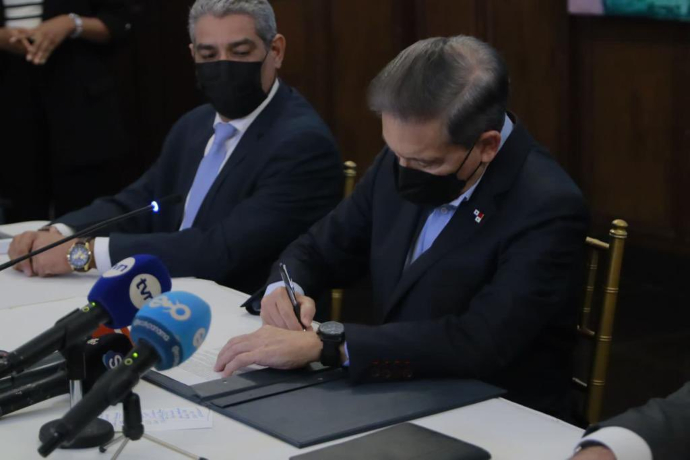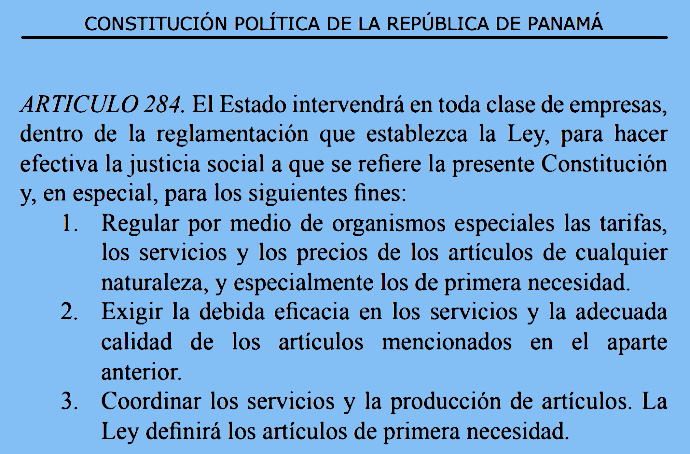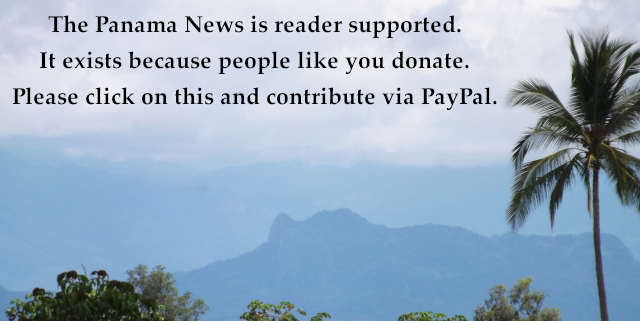President Laurentino “Nito” Cortizo Cohen, with Health Minister Dr. Luis Francisco Sucre Mejía by his side, launches one punch at the medicine supply chain as we have known it for the past several years. Here he signs an executive order repealing a 2019 lame duck decree by the Panameñista administration of Juan Carlos Varela, which in turn set the regulations for the 2001 basic law of medicines (a product of another Panameñista administration, that of Mireya Moscoso). He says he will present legislation to the National Assembly to replace that law as well. Photo by the Presidencia.
With details pending, Nito will break up exclusive medicine distributorships
by Eric Jackson
President Cortizo has signed a decree that begins the end of the medicine import oligopoly that has Panamanians paying several times the prices for medicines that our neighbors pay. As the president put it:
I have signed a decree that allows the opening of the drug market, so that other agents can import medicines under the protection of the health registry. This measure should translate into cheaper prices for quality, effective medicines for Panamanians.
His first move sweeps away the regulations implementing 2001 and 1963 laws that restricted who can import medicines. It’s not that everything will be unregulated, and details are yet to be announced. The signing ceremony came with a vague promise that under certain conditions people will be able to bring in medicines for themselves, which Customs had been confiscating of late. The main promises, however, are that bona fide pharmacies will be able to import medicines that are approved by the health registry for themselves, bypassing the importers who have held exclusive distributorships in Panama; and that properly regulated medicine labs will also be allowed to import the materials they would need to produce medicines here.
There are, however, two more steps to get from here to there.
First, Cortizo said that he will present a new basic law of medicines to replace the current one.
Second, when the legislative process is done and a new law is in place, the health ministry and/or the president would have to decree new regulations to implement the new law.
The moves came amid a strike by small pharmacies and a lockout by some of the large ones that are closely aligned with the importers. The big outlets tended to be open but not selling the 170 medicines to be subject to price controls. The smaller establishments tended to close their doors. That 30 percent price cut on the selection of medicines was decreed on August 10, to take effect on August 15. On the latter day, there was widespread resistance by the pharmacies.
The move to allow pharmacies to bypass the present importers splits the coalition that Chamber of Commerce president Marcela Galindo De Obarrio was trying to forge between the three major importers — of which she is CEO of one — and the small pharmacy businesses. The government had announced that there would be price controls, the importers said that foreign manufacturers, Panamanian small businesses and perhaps the government would have to bear the entire burden, but that they would not reduce prices themselves. A Penonome protest march meant to unite the pharmacies and the importers fizzled — only those who worked for the importers or the pharmacies they control showed up.
Does the battle now continue in the legislature and the courts? Both have historically been amenable to bribery and other undue influences, so there might be some threads of hope to maintain the current system. In this situation, however, there are business interests on both sides and much of the public sees the importers as intransigent, annoying and too expensive for Panama to afford. Plus, to pull off a legislative or legal victory in the wake of Cortizo’s stand, the importers would have to split the PRD in the legislature or get the courts to do something deeply unpopular and with little basis in Panama’s constitutional law.
Panama’s much criticized and often ignored 1972 constitution specifically authorizes price controls and public sector interventions for the goods and services of “first necessity.” This country has a long history of price controls, even prior to the present constitution.
Contact us by email at fund4thepanamanews@gmail.com
To fend off hackers, organized trolls and other online vandalism, our website comments feature is switched off. Instead, come to our Facebook page to join in the discussion.
These links are interactive — click on the boxes












